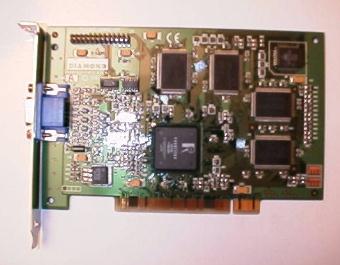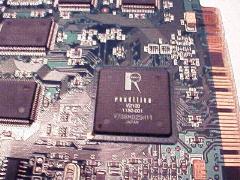
Original Link: https://www.anandtech.com/show/29
Diamond Stealth II S220 Rendition V2x00
by Anand Lal Shimpi on November 6, 1997 3:14 PM EST- Posted in
- GPUs
Verite - A French word, pronounced 'Very-tae', meaning 'truth'
Rendition Verite 2100 - A chipset, the heart of Diamond's new low cost alternative to the 2D/3D Combo Card market, the Stealth II 3D.
If you walk into a store with $99 you expect to get as much as you possibly can for that $99, right? Well, in the hardware world it may seem as though $99 won't carry you far...Diamond is here to disprove that belief, armed with Rendition's new Verite 2100 chipset and killer performance Diamond's Stealth II 3D offers the most bang for your buck. The question is, how much of a bang does $99 pay for?
| Interface: | PCI 2.1 |
| Chipset: | Rendition Verite V2100 |
| RAM: | 4MB 100MHz SGRAM |
| Data Path: | 128-bit |
| Horizontal Sync Signals: | 31.5KHz - 91KHz |
| Vertical Refresh: | 43.5Hz - 120Hz |
| RAMDAC: | 170MHz |
| TV Output: | No |
| Video Playback: | MPEG-1, Indeo, & Cinepak Supported |
| Supported Resolutions: | 640 x 480 - 1600 x 1200 |
| Supported Refresh Rates: | 56 - 120 Hz |
 |
It seems like half of the money spent on making the Stealth II 3D went to the packaging, classic of most Diamond Video Cards, the Stealth II is sold in a retail box about 4 times the size of the actual card, leaving much "breathing room" (who knows what all that space is for). Inside the box you'll find the standard "exciting game sampler CD-ROM" which is nothing more than 6 or 7 shareware demos designed to make you think that you're getting much more than what you paid for, a fairly standard marketing tactic that unfortunately just leads to a desk cluttered with cheap shareware CD's. In addition to that CD is a compact tri-fold CD package containing the Stealth II Driver CD and Diamond's classic 1-2-3 setup and troubleshooting guide. Although installing a video card is a very simple task many manufacturers decide to include bulky and intimidating user manuals that often get put away beneath tons of junk, Diamond, not being one of them, included a brief reference card as the "installation manual" for the Stealth II. A few diagrams would have been nice, but the quick installation guide packaged with the Stealth II will have to suffice, consider the card a 300 word document which basically says: "pick a slot, and stick the card in it." |
The first test system the Stealth II was used on was an AOpen AX6L Pentium II - 300 system, upon the first reboot after installing the card and its drivers (without removing the previous Millennium II drivers) the system began to load the Windows 95 desktop immediately after which it switched the monitor into suspend mode. A quick restart into safe mode confirmed that the problem wasn't because of a bad card, rather a refresh rate problem, setting the refresh rate in the Display control panel to Adapter Default instead of Optimum corrected the anomaly and allowed the system to boot properly.
Diamond's InControl Tools 95 desktop utility was installed by default, a nice little utility that allows the user to have easy access to the Start Menu regardless of the position of the mouse pointer. A quick left click of the mouse button on an open space of the desktop will activate the Start Menu at that very position, making access to all of your programs even easier than before. InControl also enables the option of switching resolutions/color depths on the fly, a useful feature if you have several users (all with their own special viewing needs) using the same workstation. Uninstalling the Stealth II is even easier than installing the card, just un-install the drivers and remove the card, no hidden registry keys, no possibilities of future hardware conflicts. Thank you Diamond.
| Is that all you get with the Stealth II? A nifty desktop utility and some shareware games on a CD? Absolutely not! Based on Rendition's Verite V2100 chipset, the Stealth II offers excellent OpenGL and Direct3D acceleration for the price of a small printer. While the 2D performance of the Stealth II isn't superb, the 3D performance almost completely makes up for it. I have to admit, that originally the Stealth II appeared to be a horrid card due to the problems with the installation and the refresh rate settings, however the S220 and the Rendition V2100 chipset really have to "grow" on you. If you don't mind dealing with a few headaches from the get-go, the Diamond Stealth II can really impress you. The 170MHz RAMDAC isn't too appealing to high end users, but you must remember that the Stealth II isn't targeted at the high end market. If you are looking for a powerful Pentium II system you are better off getting a Diamond Viper or FireGL card which will be better suited for your system, however if you are playing to the tune of a Socket-7 processor take a look at what the Stealth II can offer you for much less than either of those two cards. |  |
Is Quake 2 your game? Using the Beta GL drivers for the Verite chipset you can experience what some have called "Better than Voodoo" graphics in Quake 2, however at the time the tests were run on the Stealth II a Verite 1000 renderer was used which didn't produce the high quality effects the BetaGL drivers managed to achieve such as colored lighting, etc... In any case, the Stealth II is a near-perfect match for any average desktop system looking for a cheap upgrade to fast 3D acceleration. Since the Stealth II is a 2D/3D combo card many users may be hesitant to upgrade to one if they are attached to their current 2D cards, in that case cough up the extra $50 and purchase a 3Dfx Voodoo based Monster 3D which will offer the same quality/performance of the Stealth II without the added 2D support...it all depends on your needs. Direct3D games played quite smoothly on the Stealth II, JediKnight was playable on even the Cyrix 6x86MX test system although the player's screen did show signs of a sub 30fps frame rate at higher resolutions.
Since the Stealth II is aimed at the low end desktop market don't expect your high end 3D rendering programs to simply fly on the card, while they will benefit from the advanced 3D features of the Rendition Verite if you are looking for a high end 3D card for a purpose other than gaming give the Creative Labs Graphics Blaster EXXTREME a strong consideration.
Click here to find lowest prices on this product.
Drivers & Bundled Software
The Stealth II's Software Bundle is a bit disappointing, considering it IS a gaming card, however that $99 pricetag had to be achieved somehow...
- Acclaim Entertainment's ForsakenTM
- Electronic Arts Moto RacerTM
Sierra On-Line, Inc.'s Half Life-AVI
Sierra On-Line, Inc's SODA Off Road Racing
EIDOS Interactive's TerracideTM
Psyngosis, Ltd's Wipe Out XLTM
Diamond InControl Tools 95
Some RRedline games may have problems locking the refresh rate setting of the Stealth II during gameplay and will result in a garbled or distorted display. If this happens, you can obtain a patch from Rendition's site which will lock the refresh rate at 60Hz.
Each benchmark was run 3 times, with the final result being an average of the three. If any of the three test runs resulted in a failure the entire score was made void and the set of three tests was run again until a reliable set could be achieved or until the benchmark tests failed 3 times in a row.
The FIC PA-2012 VP3 Based Socket-7 AGP Motherboard was used for all Socket-7 CPU tests and the AOpen AX6L LX Based Slot-1 AGP Motherboard was used for all the Pentium II tests. Both test systems were configured identically with no differences other than the motherboard and processor.
A full 400MB Quake 2 installation was performed, as well as a full installation of Winstone 97 and Winbench 98. The CDROM drive present was an AOpen 24X.
The Quake 2 Timedemo Frame rates were achieved by typing the following in the Quake 2 Console (hit the '~' key to activate):
TIMEDEMO 1
DEMOMAP DEMOx.DM2
Where x is the corresponding demo number (either 1 or 2) . All Quake 2 tests were run at 640 x 480
All other tests were run at 1024 x 768 x 16 bit color
No foreign drivers were present in the test system other than those required for the system to function to the best of its ability
All foreign installation files were moved to a separate partition during the test as to prevent them from effecting the test results
Test Configuration
| Processor(s): | AMD K6/233 Cyrix 6x86MX-PR2/200+ Intel Pentium MMX - 233 Intel Pentium II 300 (512KB ECC) |
| Motherboard: | AOpen AX6L LX
Based Pentium II Motherboard FIC PA-2012 VP3 Based Socket-7 Motherboard |
| RAM: | 1 - 64MB Corsair SDRAM DIMM (w/ EEPROM) |
| Hard Drive(s): | Western Digital Caviar AC21600H |
| Video Card(s): | Diamond Stealth II S220 (4MB SGRAM) |
| Video Driver(s): | v4.10.01.0101 - 10/30/97 |
Click here to find lowest prices on this product.
| 2D Performance of the Stealth II 3D | ||
| Winstone 97 | ||
| Processor | Business | High End |
| Intel Pentium II - 300 | 63.7 | 29.9 |
| AMD K6/233 | 53.1 | 22.6 |
| Intel Pentium MMX - 233 | 49.0 | 21.4 |
| Cyrix 6x86MX/200+ (166/66) | 52.3 | 21.1 |
| 2D Performance of the Stealth II 3D | ||
| Graphics Winmark 98 | ||
| Pentium II - 300 | Business | High End |
| 800 x 600 x 8 | 125 | Not Run |
| 800 x 600 x 16 | 118 | Not Run |
| 800 x 600 x 32 | 96.3 | Not Run |
| 1024 x 768 x 8 | 119 | 139 |
| 1024 x 768 x 16 | 109 | 115 |
| Supported 3D Features | |
| Feature | Diamond Stealth II 3D (PCI) |
| Anti Aliasing | Capable |
| Alpha Bending | Capable |
| Bilinear Filtering | Capable |
| Gouraud Shading | Capable |
| Hardware Triangle Setup | Capable |
| Mip Mapping | Capable |
| Perspective Correction | Capable |
| Texture Mapping | Capable |
| Transparency | Capable |
| Z-Buffering | Capable |
| 3D Performance of the Stealth II 3D | ||
| Quake 2 Timedemo | ||
| Processor | DEMO1 | DEMO2 |
| Intel Pentium II - 300 | 17.1 fps | 16.5 fps |
| AMD K6/233 | 16.0 fps | 15.2 fps |
| Intel Pentium MMX - 233 | 16.5 fps | 15.8 fps |
| Cyrix 6x86MX/200+ (166/66) | 14.0 fps | 13.3 fps |
Image Quality
Click on images to enlarge
Note: The above screen shots were taken using the V1000 Renderer for Quake 2, notice the
lack of any colored lighting effects. Those are restored in the MiniGL Beta for the
V2100 chipset..
Have $99 to spare? Want a new 3D card? Ditch the old world of software rendering and enter the universe of OpenGL and Direct3D with Diamond's effective answer to the claim that for high quality 3D acceleration one must spend a lot of money.













